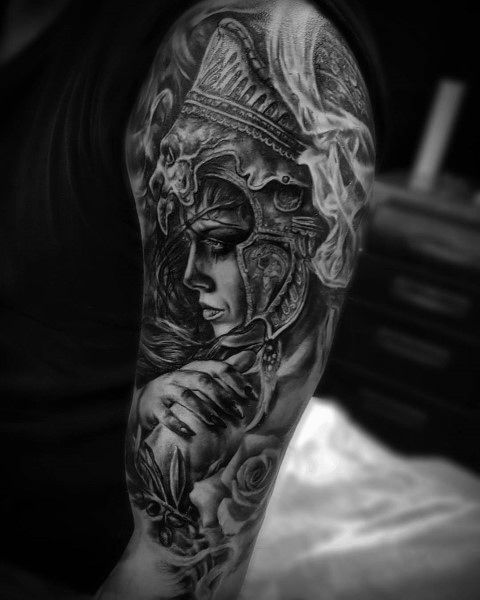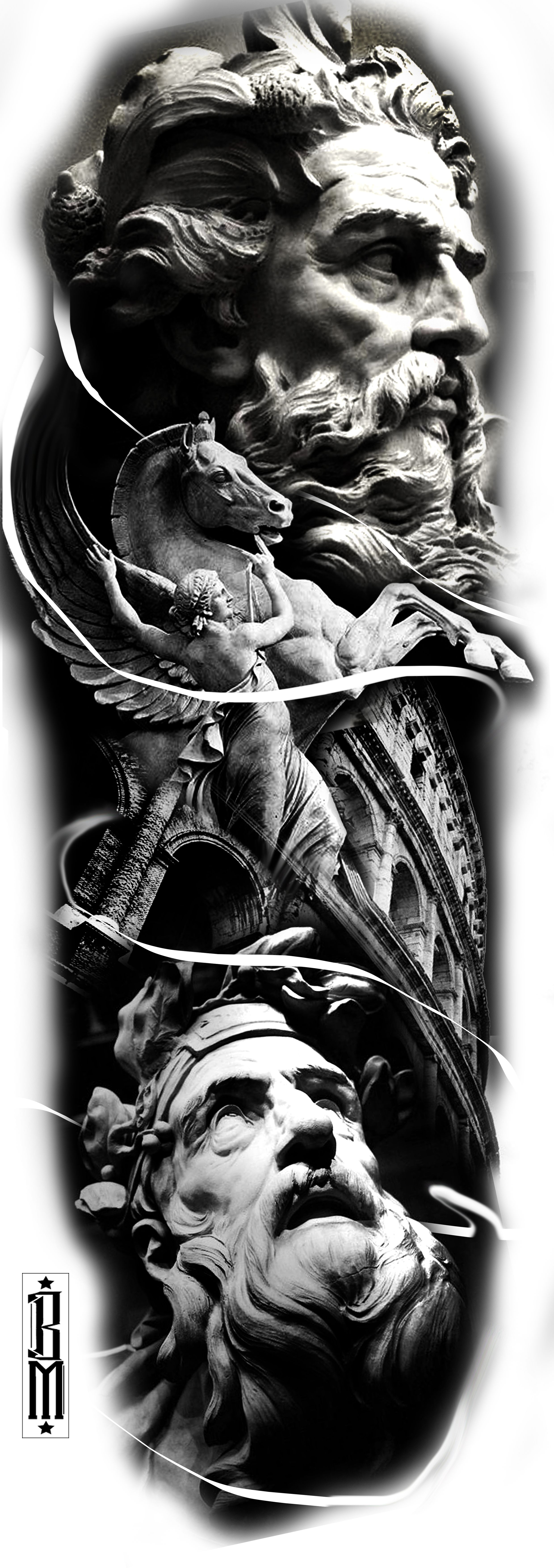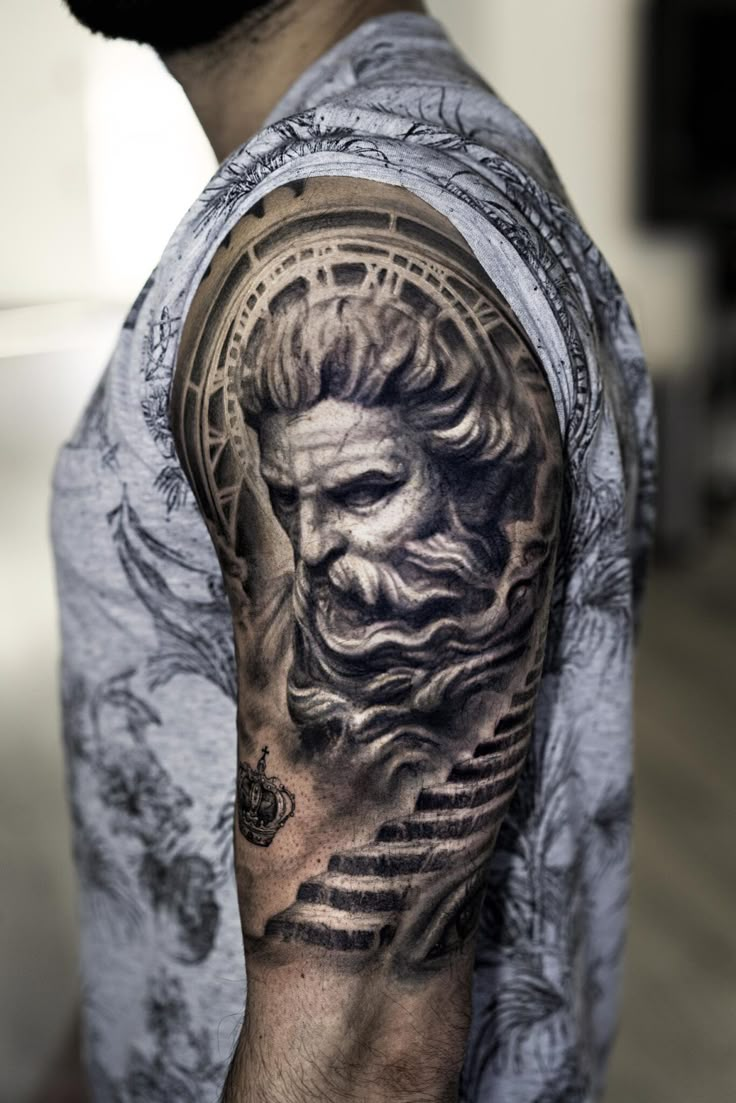Tattoos have become an increasingly popular form of self-expression, allowing individuals to showcase their passions, beliefs, and cultural heritage. Among the myriad of tattoo designs, Greek mythology stands out as a captivating and timeless source of inspiration. The rich pantheon of Greek gods and goddesses, with their unique stories and symbolism, offers a wealth of artistic possibilities for tattoo enthusiasts. This article delves into the world of Greek god tattoos, exploring their historical significance, popular design choices, and the deeper meanings they can hold for those who bear them.
The Enduring Appeal of Greek Mythology in Tattoos

Greek mythology has captivated humanity for millennia, and its influence extends far beyond the ancient world. The stories of the Greek gods and their complex relationships, struggles, and triumphs continue to resonate with modern audiences. This enduring appeal makes Greek mythology an ideal subject for tattoos, allowing individuals to connect with ancient narratives and embody the characteristics and powers associated with these divine figures.
Tattoos inspired by Greek mythology often serve as more than just decorative art. They can represent a deep personal connection to a specific god or goddess, symbolize a life philosophy, or commemorate a significant life event. The versatility of Greek mythology allows for a wide range of interpretations, making it a rich source of tattoo inspiration that caters to diverse tastes and personal narratives.
Designing Greek God Tattoos: Key Considerations

When creating a Greek god tattoo, several key considerations come into play to ensure the design is both aesthetically pleasing and true to the mythology it represents.
Choosing the Right Deity
The first step in designing a Greek god tattoo is selecting the deity that resonates most with the individual. Each Greek god and goddess has unique attributes, domains, and stories associated with them. For example, Zeus, the king of the gods, is often depicted with his iconic thunderbolt, symbolizing power and authority. Athena, the goddess of wisdom and warfare, is commonly represented with an owl, a symbol of knowledge and strategic thinking. Understanding the attributes and symbolism of each deity is crucial in creating a tattoo that captures their essence accurately.
Symbolism and Personal Interpretation
Beyond the visual representation of the deity, Greek god tattoos often incorporate additional symbols and elements to convey deeper meanings. These symbols can include animals, plants, or objects associated with the chosen deity, further enhancing the tattoo’s narrative. For instance, a tattoo of Apollo, the god of the sun and music, might include a lyre or a sun disc to emphasize his musical and solar associations. By incorporating these symbolic elements, the tattoo becomes a rich tapestry of meaning, reflecting the individual’s connection to the deity and their unique interpretation of the mythology.
Style and Artistic Interpretation
The artistic style of a Greek god tattoo can greatly influence its overall impact and appeal. From traditional Greek art styles that capture the classic beauty of ancient sculptures to more modern interpretations that infuse the design with contemporary flair, the artistic approach is a critical consideration. Some tattoo artists may opt for a realistic style, capturing the intricate details of the deity’s features and attire. Others might lean towards a more stylized or abstract approach, using unique shading techniques or bold lines to create a distinctive and eye-catching design.
Size and Placement
The size and placement of a Greek god tattoo are also important factors in its overall design. Larger tattoos, often covering a significant portion of the body, allow for intricate details and complex compositions, providing a canvas for an entire mythological scene. Smaller tattoos, while more discrete, can still pack a powerful punch, especially when strategically placed. The placement of the tattoo can also add layers of meaning, with certain body parts traditionally associated with specific deities in Greek mythology.
Exploring Popular Greek God Tattoo Designs
The vast pantheon of Greek gods and goddesses offers a plethora of design possibilities for tattoos. Here, we delve into some of the most popular Greek god tattoo designs, exploring their symbolism and visual appeal.
Zeus: The King of the Gods
As the ruler of Mount Olympus and the god of the sky and thunder, Zeus is a powerful and revered figure in Greek mythology. Zeus tattoos often depict his iconic thunderbolt, symbolizing his mighty power and divine authority. The thunderbolt, with its dynamic energy and striking visual appeal, makes for a captivating tattoo design. Zeus tattoos can also incorporate other symbols associated with him, such as the eagle, his sacred animal, or the oak tree, which was sacred to him in ancient Greek culture.
Athena: Goddess of Wisdom and Strategy
Athena, the goddess of wisdom, warfare, and strategic thinking, is a popular choice for tattoos among those who value intellect and strategic prowess. Athena tattoos often feature her iconic helmet, symbolizing her warrior spirit and strategic mind. The owl, a symbol of wisdom and knowledge, is another common element in Athena tattoos. These tattoos can also incorporate the olive branch, representing peace and Athena’s role as a patron of the arts and crafts.
Apollo: God of the Sun and Music
Apollo, the god of the sun, music, and prophecy, is a figure of great beauty and power in Greek mythology. Apollo tattoos often capture his radiant presence, with the sun as a central element. The lyre, Apollo’s sacred instrument, is another popular feature in these tattoos, symbolizing his musical prowess and association with the arts. Apollo tattoos can also incorporate the laurel wreath, a symbol of victory and his role as a protector of athletes and performers.
Artemis: Goddess of the Hunt and Wilderness
Artemis, the goddess of the hunt, wilderness, and the moon, is a powerful and independent figure in Greek mythology. Artemis tattoos often depict her with her bow and arrow, symbolizing her prowess as a huntress and her association with the natural world. The moon, with its ever-changing phases, is another common element in Artemis tattoos, representing her lunar domain and her connection to the night and its mysteries.
Hera: Queen of the Gods and Goddess of Marriage
Hera, the wife of Zeus and the queen of the gods, is a complex and powerful figure in Greek mythology. Hera tattoos often capture her regal presence, with symbols of royalty and marriage. The peacock, with its vibrant plumage and association with Hera’s chariot, is a common element in these tattoos. Hera tattoos can also incorporate the pomegranate, a symbol of fertility and marriage, reflecting her role as the goddess of marriage and childbirth.
The Significance of Greek God Tattoos: Beyond Aesthetics
Greek god tattoos are more than just visually appealing works of art. They often carry deep personal significance for the individuals who choose to ink their bodies with these divine figures. The symbolism and narratives associated with Greek mythology allow for a wide range of interpretations, making these tattoos a powerful form of self-expression and a way to connect with ancient wisdom and cultural heritage.
For some, a Greek god tattoo might represent a personal connection to a specific deity, embodying their attributes and powers. For others, it could symbolize a life philosophy or a significant life event, with the tattoo serving as a reminder of their journey and growth. The versatility of Greek mythology ensures that these tattoos can hold unique meanings for each individual, making them a deeply personal and meaningful form of body art.
The Future of Greek God Tattoos: Trends and Innovations

As the art of tattooing continues to evolve, so too do the trends and innovations in Greek god tattoos. Contemporary artists are pushing the boundaries of traditional designs, incorporating modern techniques and styles to create unique and captivating interpretations of these ancient deities.
One emerging trend is the fusion of Greek mythology with other cultural influences, creating hybrid tattoos that blend different artistic styles and symbolic elements. This fusion allows for a rich tapestry of cultural narratives, adding depth and complexity to the tattoo's meaning. Additionally, the use of color and shading techniques has evolved, with artists experimenting with vibrant hues and intricate shading to bring these deities to life in new and exciting ways.
Furthermore, the increasing popularity of Greek mythology in popular culture, from blockbuster movies to literary adaptations, has sparked renewed interest in Greek god tattoos. This cultural phenomenon has led to a surge in demand for tattoos that capture the essence of these iconic figures, with artists responding by creating designs that are both true to the mythology and relevant to modern audiences.
Conclusion: Embracing the Timeless Appeal of Greek Mythology
Greek god tattoos are a testament to the enduring appeal of Greek mythology and its ability to inspire and captivate audiences across time and cultures. From their rich symbolism and narrative depth to their visual beauty and artistic versatility, these tattoos offer a unique and powerful form of self-expression. Whether it’s the mighty Zeus, the wise Athena, or any of the other captivating Greek gods and goddesses, these divine figures continue to inspire and influence tattoo enthusiasts, ensuring that Greek mythology remains a vibrant and relevant source of tattoo inspiration for generations to come.
How can I ensure my Greek god tattoo accurately represents the deity I choose?
+Research is key! Dive deep into the mythology and symbolism associated with your chosen deity. Understand their attributes, domains, and stories to ensure your tattoo accurately captures their essence. Consult with your tattoo artist, who can guide you in creating a design that is both visually appealing and true to the mythology.
Are there any specific body parts associated with certain Greek gods or goddesses in tattoo placement?
+Yes, in ancient Greek culture, certain body parts were traditionally associated with specific deities. For example, the forehead was often associated with Apollo, reflecting his role as the god of prophecy. The chest or upper arm might be associated with Zeus, symbolizing his power and authority. However, these associations are not set in stone, and the placement of your tattoo should ultimately align with your personal preferences and the design’s aesthetic.
What are some unique and modern twists on traditional Greek god tattoo designs?
+Contemporary tattoo artists are pushing the boundaries of traditional Greek god tattoos by incorporating modern techniques and styles. This includes experimenting with color, shading, and lighting effects to create a more dynamic and contemporary feel. Some artists also fuse Greek mythology with other cultural influences, creating hybrid tattoos that blend different artistic styles and symbolic elements.